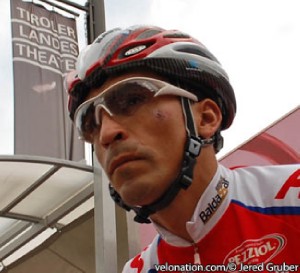Paco Guzman feels that the absence of radios caused crashes on tricky descent
 The director of the recently completed Vuelta a Murcia, Paco Guzman, threw his opinion into the bubbling stew of radio ban discontent on Monday.
The director of the recently completed Vuelta a Murcia, Paco Guzman, threw his opinion into the bubbling stew of radio ban discontent on Monday.
The director of the tough three day stage race, which saw Alberto Contador win the last two stages and the overall feels that race radios would have made his race safer and perhaps spared Ruben Plaza his broken leg, Mikel Landa a broken collarbone, and Mauricio Soler a bad crash.
Overall, the director feels that his race accomplished much with only limited resources. In that regard, he calls the race a success. Looking beyond the mere act of holding the race and putting together a solid three days of racing, Guzman takes a much more critical look at what happened, particularly on the final descent of the crucial second stage.
“Crashes in the first two stages, especially on the Collado Bermejo, are my failure,” says Guzman to Biciciclismo. “That a brave rider like Ruben Plaza should lose most of his season due to his desire to be among the first riders, or that a rider like Mikel Landa should have to undergo surgery does not leave me satisfied, quite the opposite.”
The Spanish director feels the accidents could have been avoided though – if the riders had radios. The thrilling nature of a race without any radio communication might have caused the crashes, according to Guzman. Guzman feels the lack of information and the chaos of the final descent caused riders to take risks they otherwise might not have.
“I’m sure if Ruben, Mikel, and Mauricio had received information that their rivals were close, but they just could not quite see them, they would have risked less and the Vuelta a Murcia would have been a success.”
In his letter to the website, Biciciclismo, he asks for the safety and security that he feels the radio can provide.
“So from our little race, I make a call. A call for security. I think the radio should return.”
It’s an interesting point. Some will say that this is proof that radio-less racing provokes a better race. It’s true in this regard. Riders didn’t know where they were in relation to those that they were chasing and those coming from behind, so they took more risks. Unfortunately, three riders came to grief on one descent because of that.
For a director like Guzman, a descent like that would likely not be included in the future if radios do not return. Who wants to see a rider out for most of the season in an early stage race? Perhaps one of the results of the radio ban could be a reduction in entertaining courses to ensure rider safety?
The radio war is without question one of the biggest stories of the 2011 season, and it’s promising to continue to hold its spot for some time to come.